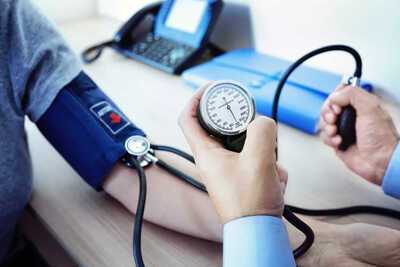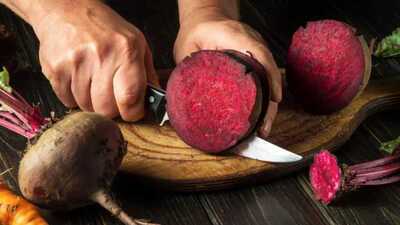High blood pressure is a silent killer. If not managed properly, it can lead to stroke, heart disease, kidney disease, and other chronic diseases. For older adults, managing blood pressure is especially tricky. What if lowering blood pressure is as simple as drinking a delightful juice? Yes, you read it right. You can now drink a certain juice and lower blood pressure. A recent study has found that drinking beetroot juice can help lower blood pressure, even in older adults.
A study led by researchers at the University of Exeter found that beetroot juice has the potential to lower blood pressure in older people by changing the oral microbiome. The findings are published in the journal Free Radical Biology and Medicine. Before we dive into the miraculous effects of drinking beetroot juice, let’s understand high blood pressure.
What is high blood pressure

High blood pressure, also known as hypertension, happens when the force of blood pushing against the artery walls is consistently too high. The pressure goes too high, 140/90 mmHg or higher. The normal blood pressure is less than 120/80 mm Hg. Over time, this high pressure damages the arteries and leads to serious complications like a heart attack and stroke. What makes hypertension dangerous is that you won’t know whether you have it unless you check it. Because there are hardly any signs or symptoms. Almost half of the population is unaware that they are living with hypertension.
Beetroot juice and high blood pressure

Previous studies have shown that a high nitrate diet can reduce blood pressure. This could slash the risk of many chronic diseases, including heart disease. This new study which is the largest study of its kind, looked at why the high nitrate diet lowers blood pressure, especially in older individuals. Nitrate is essential for the body and is a natural part of a vegetable-rich diet. The researchers found that in older adults who consumed a concentrated beetroot juice ‘shot’ twice a day for two weeks, the blood pressure lowered. Interestingly, this is effect was not seen in the younger group.
Video
Oral microbiome’s role

To understand the effects of beetroot juice, the researchers studied 39 adults under the age of 30 and 36 adults in their 60s and 70s. The participants were given beetroot juice for two weeks and a placebo version with nitrate removed for another two weeks, with a washout period in between. The researchers found that nitrate-rich beetroot juice lowered blood pressure in older people due to the suppression of potentially harmful bacteria in the mouth. When there is an imbalance between beneficial and harmful oral bacteria, it can lead to a decrease in the conversion of nitrate (abundant in vegetable-rich diets) to nitric oxide. Nitric oxide is essential for the healthy functioning of the blood vessels and, therefore, the regulation of blood pressure.
“We know that a nitrate-rich diet has health benefits, and older people produce less of their own nitric oxide as they age. They also tend to have higher blood pressure, which can be linked to cardiovascular complications like heart attack and stroke. Encouraging older adults to consume more nitrate-rich vegetables could have significant long-term health benefits. The good news is that if you don’t like beetroot, there are many nitrate-rich alternatives like spinach, rocket, fennel, celery, and kale,” study author Professor Anni Vanhatalo, of the University of Exeter, said in a statement.
“This study shows that nitrate-rich foods alter the oral microbiome in a way that could result in less inflammation, as well as a lowering of blood pressure in older people. This paves the way for larger studies to explore the influence of lifestyle factors and biological sex in how people respond to dietary nitrate supplementation,” co-author Professor Andy Jones, of the University of Exeter, said.
“This research is a great example of how bioscience can help us better understand the complex links between diet, the microbiome and healthy ageing. By uncovering how dietary nitrate affects oral bacteria and blood pressure in older adults, the study opens up new opportunities for improving vascular health through nutrition. BBSRC is proud to have supported this innovative partnership between academic researchers and industry to advance knowledge with real-world benefits,” Dr Lee Beniston FRSB, Associate Director for Industry Partnerships and Collaborative Research and Development at BBSRC, added.
A study led by researchers at the University of Exeter found that beetroot juice has the potential to lower blood pressure in older people by changing the oral microbiome. The findings are published in the journal Free Radical Biology and Medicine. Before we dive into the miraculous effects of drinking beetroot juice, let’s understand high blood pressure.
What is high blood pressure
High blood pressure, also known as hypertension, happens when the force of blood pushing against the artery walls is consistently too high. The pressure goes too high, 140/90 mmHg or higher. The normal blood pressure is less than 120/80 mm Hg. Over time, this high pressure damages the arteries and leads to serious complications like a heart attack and stroke. What makes hypertension dangerous is that you won’t know whether you have it unless you check it. Because there are hardly any signs or symptoms. Almost half of the population is unaware that they are living with hypertension.
Beetroot juice and high blood pressure

Previous studies have shown that a high nitrate diet can reduce blood pressure. This could slash the risk of many chronic diseases, including heart disease. This new study which is the largest study of its kind, looked at why the high nitrate diet lowers blood pressure, especially in older individuals. Nitrate is essential for the body and is a natural part of a vegetable-rich diet. The researchers found that in older adults who consumed a concentrated beetroot juice ‘shot’ twice a day for two weeks, the blood pressure lowered. Interestingly, this is effect was not seen in the younger group.
Video
Oral microbiome’s role
To understand the effects of beetroot juice, the researchers studied 39 adults under the age of 30 and 36 adults in their 60s and 70s. The participants were given beetroot juice for two weeks and a placebo version with nitrate removed for another two weeks, with a washout period in between. The researchers found that nitrate-rich beetroot juice lowered blood pressure in older people due to the suppression of potentially harmful bacteria in the mouth. When there is an imbalance between beneficial and harmful oral bacteria, it can lead to a decrease in the conversion of nitrate (abundant in vegetable-rich diets) to nitric oxide. Nitric oxide is essential for the healthy functioning of the blood vessels and, therefore, the regulation of blood pressure.
“We know that a nitrate-rich diet has health benefits, and older people produce less of their own nitric oxide as they age. They also tend to have higher blood pressure, which can be linked to cardiovascular complications like heart attack and stroke. Encouraging older adults to consume more nitrate-rich vegetables could have significant long-term health benefits. The good news is that if you don’t like beetroot, there are many nitrate-rich alternatives like spinach, rocket, fennel, celery, and kale,” study author Professor Anni Vanhatalo, of the University of Exeter, said in a statement.
“This study shows that nitrate-rich foods alter the oral microbiome in a way that could result in less inflammation, as well as a lowering of blood pressure in older people. This paves the way for larger studies to explore the influence of lifestyle factors and biological sex in how people respond to dietary nitrate supplementation,” co-author Professor Andy Jones, of the University of Exeter, said.
“This research is a great example of how bioscience can help us better understand the complex links between diet, the microbiome and healthy ageing. By uncovering how dietary nitrate affects oral bacteria and blood pressure in older adults, the study opens up new opportunities for improving vascular health through nutrition. BBSRC is proud to have supported this innovative partnership between academic researchers and industry to advance knowledge with real-world benefits,” Dr Lee Beniston FRSB, Associate Director for Industry Partnerships and Collaborative Research and Development at BBSRC, added.
You may also like

Pradhan hits back at congress on OBC claims, cites Modi govt's record on reservation

Lindsay Lohan's 'industry secret' under-eye balm fixes creased concealer and blurs fine lines

Mahindra Logistics leases nearly 3 lakh sq ft industrial space in Pune

Martin Lewis says cut £200 off bills now as Octopus launches 'cheapest no penalty' fix

'Pretty' Roman dress that disguises tummy is flying off the rails for £30






